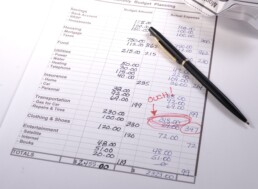The Financial Reasons Small Businesses Fail
Almost every entrepreneur has heard the statistic: 80% of small businesses fail. There are many reasons this happens, and can include everything from market slumps to lazy owners. To enumerate every way a business can go under would be an endless, impossible task.
However, there are a few financial characteristics frequently found in struggling businesses. Here are the most common financial reasons small businesses fail.
There's no plan. It's not uncommon to meet new small business owners who have a brilliant product idea, a well-developed marketing plan, a slick website, and not one thought given to their budget. We've already written on the tough financial questions to answer before starting your own business, but the importance of a solid financial bedrock cannot be overemphasized. A well-researched budget and fixed goals is the key to surviving that crucial first year in which most businesses go under. Great customer service and spot-on marketing are not enough to balance out shaky financials.
Speaking of customer service...

Poor credit management and pricing strategies are bad for everyone. No one craves popularity like an entrepreneur and, when your business's success is entwined with how well-liked you are, the urge to avoid offending anyone becomes even stronger. In the early days of a business, when there are only a few customers, there is a common impulse to let clients slide on late payments, or to offer frequent "friends and family" discounts. It's easy to justify this with the logic with the idea that you need to establish customer loyalty, and you can tighten the reins a bit when you have a solid customer base. There are a few reasons this doesn't work:
- Clients who don't pay on time aren't going to appreciate the slack you've given them in the past; they are going to resent the restrictions you enforce in the future.
- Likewise, your patrons who are just coming to you for the lowest price will quickly go elsewhere when your rates rise.
Lenient accounts receivable and cheap pricing might gain you a quick boost in early sales, but they are not a sustainable model. Delivering a product you can be proud of, at a price that is worth your hard work and can keep your business afloat (and actually requiring customers pay you that fair price) ensures that your customers the pleasure of patronizing your business for years to come. Because you have to remember...

Cash is king. Yes, it's a cliche, but that doesn't make it any less true. A great business model matters little if you run out of money before you can implement it. Managing cash flow is key to not just the health but the continued existence of your business. Here are a few of the most common cash pitfalls small businesses face:
1.) Insufficient capital. In all likelihood, your business will not be immediately profitable. So not only do you need enough cash to get your business started, but you need enough to allow yourself to operate at a loss for a while.
2.) Not having a large enough cash cushion. Think "Princess & the Pea" levels of padding. Regardless of how well you plan, the economy is unpredictable. Look to history for examples. No one expected the Boston Molasses flood which, in addition to the damage caused and lives lost, resulted in a nearly $11M settlement (in today's money) for the responsible company.
3.) Over-investing in fixed assets. It's great to plan for the long-term but, if you don't plan for the short-term as well, your business will not get a long-term. Sacrificing too much of your cash for something like manufacturing equipment (even if you're getting a great deal) can hurt you, as that is not a liquid asset and will be of no help to you in the event of an emergency (i.e. your factory flooding a major metropolis with 2.3M gallons of molasses). Think of it like a game of Monopoly; if you start building hotels too soon and suddenly need cash, you're stuck selling all your buildings back to the bank for half-price, and you know bankruptcy is right around the corner. Only, in real business, instead of losing yet another game to your annoying brother-in-law, you've lost your entire livelihood.
Expanding your business is the ultimate goal, but maintaining cash flow gives you the solid foundation you need to build upon.
80% of new businesses fail, but that means 20% succeed. To be that 1 out of 5, have a plan, know your value, and remain patient. Better to start small and grow something big than to start too big and dwindle away.
Tough Financial Questions to Answer Before Starting Your Own Business
Almost everyone, at some point in their lives, entertains the idea of starting their own business. For most it's a purely speculative exercise, a fun "What if...?" daydream. But for those who start seriously contemplating entrepreneurship, there are a lot of tough questions to consider.
Now, there are hundreds of articles out there with titles like "Do you have the mind of an entrepreneur?" and "Is starting your own business right for you?" This isn't like that. There's no personality quiz here, nor checklist of character traits. This is because...
A.) Those articles frequently aren't very realistic. Personality quizzes don't work because not all businesses require the same personality. Checklists don't work because everyone thinks they are "reliable" or "able to think outside the box".
B.) We're numbers people. Numbers don't lie, and neither do we. So we're going to skip the fluff and go straight to the tough financial questions you need answered before you start your own business.
What is your break-even point?
Of course, there are lots of accounting questions regarding business entities, expenses, profit-margins, etc., but this is really the big one. How much do you need in sales before you are making money instead of losing it?
You'd be surprised at how many people we meet who do not have this question answered, though almost everything hinges on it. It really is necessary to know your break-even point because it ties your financials together and paints a clear goal. Because, isolated from each other, numbers can be deceiving. For instance, $100,000 in sales may look like a great success, until you compare it against $150,000 in expenses. Likewise, even if you keep expenses low, if your sales are lower, you are still operating at a loss. Knowing your break-even point lets you know exactly what your target is.
How l ong can you run in the red?
ong can you run in the red?
In a perfect world, every business would be instantly profitable. Obviously, we don't live in a perfect world. And, in our imperfect world, most new businesses take some time to hit their stride.
Early failure is, in some ways, a natural part of a new business. When you're the new leader of a new company, it's a bit like going from playing a sport to coaching it. Even if you're a professional, the strategies that worked for you as an individual might not work on a larger scale, and you have additional responsibilities piled on you as well. Initial setbacks are to be expected.
"The most important thing for entrepreneurs is not to be put off by failure." - Sir Richard Branson (Source.)
That's not to say everything is doom and gloom, however. Many new businesses do go on to long-term success. However, new businesses owners have to be realistic and be prepared to deal with and mitigate some degree of failure early on.
This is why it is so very important to know how long your company can run at a loss. Too many new business owners, clouded by the dream of their assured success, expand too aggressively and wake up one day to find their capital is gone. Knowing in advance, "I can operate at x loss for y months," can help you set goals, know when to cut back and, in general, prepare for the unexpected. (And with a new business, the unexpected is inevitable.)
What 's your exit strategy?
's your exit strategy?
In fact, according to data strategist Thomas Thurston, somewhere between 70%-80% new small businesses fail within their first 10 years. (Source.) That leaves, at best, a long-term success rate of less than a third. And, according to the SBA (Small Business Administration), 552,600 new businesses opened in 2009, but, that same year, 660,900 closed. (Source.)
Obviously, losing a business is hard, but not being prepared can make it even harder. For example, something as seemingly simple as how you register your business entity can affect whether your personal assets are at risk in the event of a closure.
Now, hang on, because we're getting to the bright side. Maybe you're going to leave your business because it's so successful. You want to cash-in, leave behind the stress of running the show, and go retire to an island. Well, you still need an exit strategy for that. How you set your business up in the early days can affect how much reward you get for the years of work and risk you invested in it.
In fact, we frequently advise our clients to always, regardless of their long-term plans, keep their books as clean as though they were planning on selling the company. As we mentioned in the previous point, life, inevitably, happens, but the unexpected is much easier to weather with pristine financials.


